News from AMES Australia
Read about the latest news, research and initiatives from migrant and refugee settlement agency AMES Australia:
Records set in helping refugees find homes
AMES Australia’s Accommodation Team has been setting records in finding housing for refugee clients in Melbourne with more than 3550 people finding a place to call home.
In 2016 the Accommodation Team placed 455 families into short term residences on arrival and helped transition 1043 families into their own long-term housing.
During the first quarter of 2016 about 150 people were assisted with short term accommodation, but that increased significantly to 640 people by the end of December.
About 316 people were helped with the transition into their own homes in the same period but this increased to 1428 people in the last quarter of the year.
The surge in client arrivals was due to the cohort of Syrian and Iraqi refugees displaced by the conflict there and the federal government’s decision to accept 12,000 extra refugees.
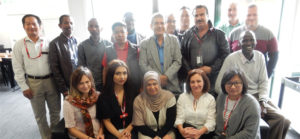 The increases in the last quarter of 2016 came about with many families wanting to be reunited with relatives already here before the festive season.
The increases in the last quarter of 2016 came about with many families wanting to be reunited with relatives already here before the festive season.
AMES Australia Accommodation Team Leader Lyn Gao said the local community sector was surprised and slightly overwhelmed by the influx.
“But in the end so many people stepped up and helped out,” she said.
“With fantastic relationships with Real Estate Agents, our Accommodation Team, in particular the Housing Workers, were able to navigate through the private rental market and find private rentals for clients that are close to public transport and are affordable,” Lyn said.
She said the private rental market was also stretched and even though new arrivals can often struggle to compete with other applicants, the housing workers still managed to secure properties within six weeks of clients arriving in Australia.
Job ready mentors making a difference
A recent AMES Australia initiative that saw volunteer tutors offer professional development sessions to become ‘job ready mentors’ has paid off already.
In March one of the mentees from the program secured a job as a Project Manager at Monash University heading up a landscaping and building project.
Student Arash Emami gained a six month contract at the university after being mentored by volunteer Ray Kirkwood.
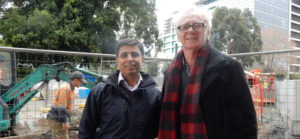 Arash, an engineer originally from Iran, said he was very happy with the support AMES Australia provided him.
Arash, an engineer originally from Iran, said he was very happy with the support AMES Australia provided him.
“The course I did with AMES was very helpful and my mentor Ray was a big help in my getting a job,” Arash said.
“Hopefully now I will be able to continue to build my career here in Australia,” he said.
Ray said he was pleased to be able to help Arash kick off his career in Australia.
“It was a terrific experience to work with Arash and it really highlights the importance of our role as mentors and advisors and CV writers,” Ray said.
“We started off with his CV in a raw state and we worked on the cultural approach that he needed to take with it to encourage potential employers to consider him for a job,” he said.
AMES Australia Volunteer Tutor Program (VTP) co-ordinators have been offering tutors the professional development sessions for about nine months.
AMES Australia VTP Co-ordinator Kirstin Bardwell said the volunteers were subsequently matched to a student in a one-on-one setting and meet once a week for five weeks with the objective of supporting the student in their job search.
“Students have typically participated in Settlement Language Pathways to Employment (SLPET) courses and we had a particularly good outcome back in early March with Arash and Ray,” Kristen said.
AMES Australia signs MoU with Royal Women’s
AMES Australia has signed a Memorandum of Understanding (MoU) with the Royal Women’s Hospital (RWH) in a move to improve cross cultural support for patients and families.
The MoU recognises the growing number of families attending the hospital who do not speak fluent English, have recently arrived in Australia, or have cultural or religious circumstances that are not readily supported in the hospital.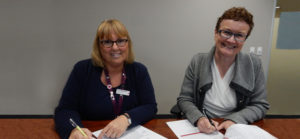
Among the first activities to be facilitated under the MoU are orientation tours for settlement clients and the forging of closer relationships between the hospital and case managers.
The MoU also means closer collaboration between AMES Australia and the Royal Women’s Hospital on issues around the prevention of violence against women and programs to improve clients’ health literacy. There may also be opportunities for employment clients to tour the hospital to learn about potential job opportunities.
AMES Australia CEO, Cath Scarth said the partnership between AMES Australia and the Royal Women’s Hospital was one that would continue to benefit both organisations immensely.
She said that a cross-portfolio working group within AMES Australia and consultations with the Royal Women’s Hospital had identified which activities would be useful for the hospital’s patients.
“Many of AMES Australia’s clients are from newly emerging communities who may have little understanding of a public health system. We know that the AMES Australia – Royal Women’s Hospital relationship will help to reduce these difficulties and barriers,” Cath said.
RWH CEO Sue Matthews said a lack of cultural awareness in the health setting was a barrier to delivering great care to women.
Early support improves migrant employment outcomes – AMES Australia study
AMES Australia’s research and policy unit recently completed some new research that shows language courses geared to employment can be highly effective in getting migrants from non-English speaking backgrounds into work, especially if they are begun soon after arrival.
Including work placements, which give migrants first-hand experience of Australian workplaces, in the courses is also valuable, the study found.
It also found that post course support, such as job clubs, can help migrants who do not immediately find work into employment.
The study surveyed 460 newly arrived migrants and refugees studying English in Melbourne through Settlement Language Pathways to Employment (SLPET) courses about their employment experiences.
It found newly arrived migrants and refugees struggle to break into Australia’s labour market but can succeed if given adequate early support in job hunting.
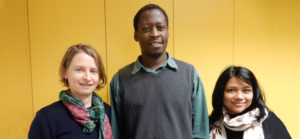 The study titled ‘Transitions to employment and education for new migrants in Australia’ found many migrants were underemployed, had lost career status and were on low wages.
The study titled ‘Transitions to employment and education for new migrants in Australia’ found many migrants were underemployed, had lost career status and were on low wages.
Although 75 per cent of respondents had overseas work experience at the point of enrolment in their course, less than a quarter (24 per cent) had gotten a job in Australia, the study by refugee and migrant settlement agency AMES Australia found.
It found that six months after completing a course 61 per cent of respondents were available for work. Of those, just over half (56 per cent) had a job while 44 per cent were looking for work.
The study found that completing a course sooner gave migrants a better chance of finding a job.
“Sixty three per cent of people who started a course within six months of arrival were working compared to 50 per cent of those who had been in Australia for five years or longer,” the study said.
The study’s authors Monica O’Dwyer, Rizwana Shamshad, Stella Mulder and Gerald Onsando, said courses such as SLPET were highly effective in assisting migrants from non-English speaking backgrounds to find work in Australia.
“They play an important role in facilitating the entry of skilled migrants with low level English into the labour market,” the researchers said.
“Work placement is an extremely valuable part of these programs. It gives migrants local work experience and can connect them with local employers,” they said.
The study found that the students believed that confidence and proficiency in English were the most important factors in finding work.
New community garden for refugees in northern Melbourne
AMES Australia, in partnership with Parks Victoria, has launched a new refugee community garden at Brimbank Park.
The garden will offer people from local refugee communities the opportunity to grow produce and learn about horticulture while engaging more deeply with the wider local community.
AMES Australia Manager for International and Community Development, Melika Sheikh-Eldin, said the garden program followed a similar successful project at Werribee Park.
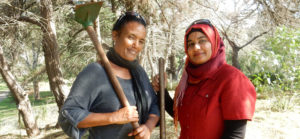 “We are hoping the garden at Brimbank will become a hub for refugees from the local communities,” Melika said.
“We are hoping the garden at Brimbank will become a hub for refugees from the local communities,” Melika said.
Refugee gardener Amelework Bezabih, from Ethiopia, said she hoped the program would help her connect better with the wider community.
“As a refugee, it is sometime hard to get out and meet people from other backgrounds. I hope the garden will help me make friends outside my own community,” Amelework said.
“It will also be very nice to grow and be able to eat organic food. And I hope the program will give me the opportunity learn more about horticulture and maybe be able to grow more of my own food,” she said.
AMES Australia CEO Cath Scarth said the garden would provide opportunities for refugees and migrants to engage with the broader Australian community.
“We see this as a way of promoting a cohesive society and giving newly arrived people connections into the communities in which they now live,” Ms Scarth said.
Laurie Nowell
AMES Australia Senior Journalist












